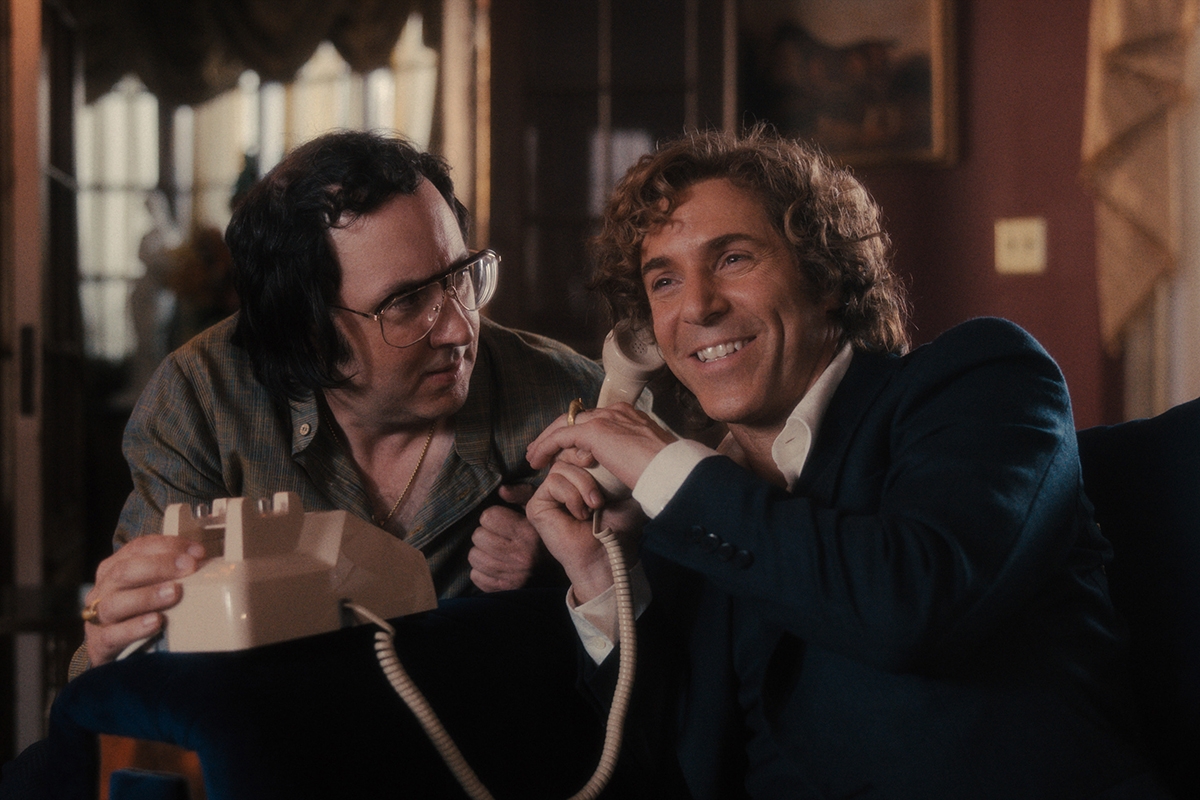The new Apple TV+ series “The Big Cigar” tells the story of how a fake film production (of a film titled, you guessed it, “The Big Cigar”) helped Black Panthers founder Huey P. Newton escape to Cuba, as the FBI was trying to frame him for a murder. The show doesn’t really delve much into the Jewish identities of the show’s two white protagonists — “Easy Rider” producer Bert Schneider (played by Alessandro Nivola) and his frequent collaborator Steve Blauner (played by P.J. Byrne) — but in many of the scenes where we see Blauner, a big Star of David necklace peeks out from his parted button-down shirt.
The truly delightful and diverting limited series paints both Schneider and Blauner as people who use their whiteness and privilege — as wealthy and connected producers — to help Newton continue his work and stay a free man. The only times their religion gets addressed is mostly through Jewish delis and accessories, and in tiny Yiddishisms along the way. There’s also a brief mention of Jewish activist Abbie Hoffman (who Sacha Baron Cohen plays in Netflix’s “The Trial”).
The lack of Jewishness doesn’t really detract from the show, which is ultimately an ode to Newton and the Black Panthers and a stark portrayal of the Black experience in America, which draws clear parallels to a fight that continues to this very day. Andre Holland plays a relatable and deeply human Newton who also serves as narrator. Viewers learn a lot about Newton: his childhood roots; what engendered his activism; the many stops in his life; the constant harassment and persecution he faced from the police.
Schneider was the scion of a Jewish movie-making legacy. His father was the head of Columbia Pictures, and early on, we see that he is drawn to activism partly due to his father’s failure to stand up for the creators around him during the McCarthy Era. Seeing his father remain silent in the face of injustice enshrines in Bert the belief that he should never be a neutral bystander in the face of other’s suffering. Newton at first dismisses Schneider, not wanting to get involved with Hollywood, but in the series, it’s the fact that Schneider is willing to put his own body at risk and even land himself in jail that ultimately wins Newton over.
Neither Newton nor Schneider are shown as idealized heroes. They’re portrayed as men who often neglect their loved ones and hurt, or at least knowingly endanger, them for their ideals. The show about “great men” with fairly big egos doesn’t give quite enough breadth to its female characters, who mostly serve as accessories. The only female character who gets ample screen time is Tiffany Boone, who plays Newton’s girlfriend Gwen Fontaine, and yet even her character left me wanting more. Still, Jamie Ray Newman absolutely shines as Roz, the sexy, tortured and frustrated wife of Blauman, who doesn’t get consulted as he uses their family home to keep Newton safe.
We don’t really get to hear from Schneider’s ex-wife, the mother of his two children whom he hopes to reconcile with but whose birthday party he quickly abandons to help out Newton. We do get to see a really beautiful and complex relationship between Schneider and his brother Stanley, played by Noah Emmerich. Stanley may not understand Bert’s activist drive, but he admires him and their mutual love is palpable. The scenes between the two of them are some of Bert’s most touching moments in the show.
And there is one particularly excellent and tense Jewish scene. The latest episode released this Friday called “Guns & Matzah” features a shootout at Canter’s Deli, the iconic Jewish deli in Los Angeles — not really a TV moment I’d have expected but a really entrancing and dramatic action scene nonetheless. Even Newton is shocked when he hears of it.
“All delis are Jewish, I think,” a still shellshocked and blood-smeared Blauner says. Schneider quickly corrects him by saying that the Italians and Greeks have them, too (to be fair, the Jewish deli is its own phenomenon).
All of this is not to say there is nothing enlightening in the series about the American Jewish experience. First of all, the Jewish experience and the Black experience of America isn’t always separate, a truth that even some of Hollywood’s biggest stars exemplify. It’s also worth remembering that the Black Panther movement had a pivotal role in Israeli history, inspiring the name and the activism of the Israeli Black Panthers.
It is true that the majority of American Jews are white, and that Jewish allyship has always had a place in the movement for Black liberation. The show talks a lot about the idea of privilege and activism, of putting conviction into action, putting your body at risk and on the line, using your whiteness to shield and help others. And in the tensions in Schneider’s family, and even within Schneider himself, the show explores the price we pay for remaining silent, and of the very human inclination so many of us have of choosing our own comfort and safety at the expense of taking action.
“The Big Cigar” does a lot in its six episodes, and yet it also manages to be imminently watchable and enjoyable thanks to its ’70s-inspired cinematography, the excellent nostalgic wardrobe and infectious music. And at the end of the day, when it comes to Jewish representation, it tells us a story of two Jewish men who do their best to make the world a little bit more just.








